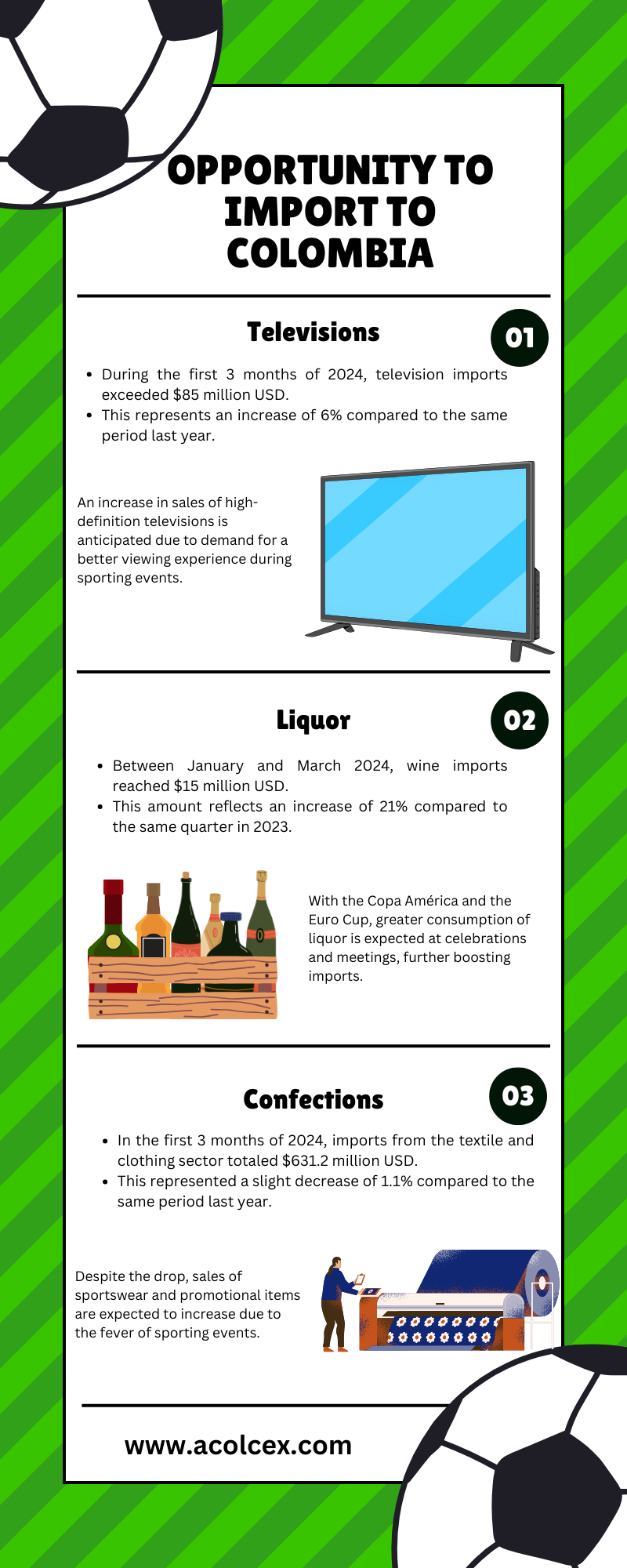Blog

The Impact of International Sports Events on Trade and Imports
Events of the magnitude of the Copa América, the Euro Cup, and the Olympics not only generate enormous excitement among sports fans but also offer significant economic opportunities globally. Various sectors benefit from the increase in trade and imports associated with these events. Below, we explore how these events impact different sectors in international trade.
1. Tourism Sector
Benefits:
- Increase in Tourism: Sports events attract thousands of tourists from all over the world, who travel to witness the games live. This increase in tourism translates into higher revenue for hotels, restaurants, and other hospitality services.
- International Promotion: These events put the host countries on the global map, promoting their tourist destinations in the long term.
Example:
During the Copa América, host cities in South America could see a significant increase in hotel occupancy and demand for tourist services.
2. Construction Sector
Benefits:
- Infrastructure: Significant investments in infrastructure, including stadiums, roads, and public transportation systems, are often made to prepare for these events.
- Job Creation: Construction projects create numerous jobs, benefiting local workers and companies in the sector.
Example:
The construction of new sports facilities and the renovation of existing ones for the Olympics could stimulate the economy and improve urban infrastructure.
3. Trade and Retail Sector
Benefits:
- Sales Increase: The influx of tourists and local enthusiasm for sports events boost sales in souvenir shops, sportswear stores, and promotional item retailers.
- New Products: Exclusive products related to the events, from official merchandise to food and beverages typical of participating countries, are imported.
- Specific Imports: During these events, there is an increase in the import of televisions, liquors, and apparel to meet local and visitor demand.
Example:
During the Euro Cup, stores in Europe could offer official team jerseys and other related products, increasing their sales. Additionally, the demand for televisions to watch the matches and liquors to celebrate increases significantly.
4. Food and Beverage Sector
Benefits:
- Increased Consumption: Sports events attract large crowds to bars, restaurants, and other food and beverage establishments where fans gather to watch the games.
- Product Imports: The import of typical beverages and foods from participating countries increases, diversifying the local gastronomic offering.
Example:
During the Olympics, the demand for international beers and snacks could increase, benefiting both local producers and importers.
5. Advertising and Marketing Sector
Benefits:
- Advertising Opportunities: Companies have the opportunity to sponsor events and teams, allowing them to reach a massive audience and enhance their brand visibility.
- Creative Campaigns: Creative and promotional advertising campaigns are developed, capturing consumer attention and fostering brand loyalty.
Example:
Sports brands could launch special campaigns during the Copa América, leveraging the excitement of the event to connect with consumers.
6. Technology and Telecommunications Sector
Benefits:
- Service Demand: The increase in tourist activity and the interest in following sports events live boost the demand for telecommunications services, such as high-speed internet and data transmission.
- Technological Innovations: Technological innovation is promoted, with the implementation of new technologies to enhance the viewer experience.
Example:
During the Olympics, telecommunications companies could offer special streaming packages and improve internet infrastructure to handle the increase in data traffic.

